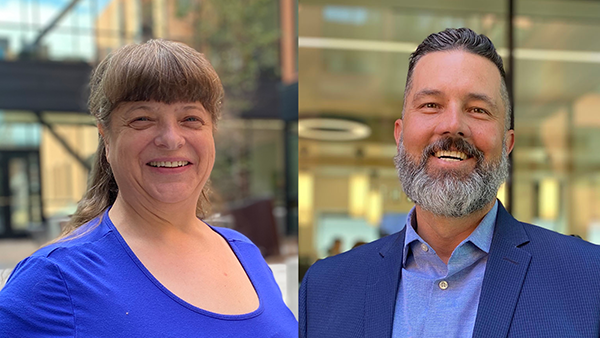USU’s Developmental Disabilities Network Journal Marks 3rd Anniversary

DDNJ Assistant Editor Mary Ellen Heiner and Editor-in-Chief Matthew Wappett
Three years ago, the Institute for Disability Research, Policy & Practice at Utah State University launched an academic journal with two ambitious ideas: Research about people with disabilities should include perspectives from them and their families, and it should be accessible to everyone.
The Developmental Disabilities Network Journal celebrates its third anniversary this month. In the last three years, people with disabilities from many different backgrounds have contributed to its pages. Its content has been downloaded 13,000 times in 70 countries. The companion DDNJ Author Insights Podcast launched in December of 2021, offering perspectives on disability research and the effect it can have on people’s lives.
“We want it to be understandable and relevant to people of all abilities,” said Mary Ellen Heiner, an assistant editor of the DDNJ. “That’s what it’s all about.”
A special edition on COVID’s impact on services prompted a lot of content from both service providers and people who relied on the services. An issue devoted to mental health included authors and reviewers who lived the experience.
When people with disabilities are fully included, “the research will reflect more authentically what the needs, hopes, dreams and desires of people with disabilities are,” said Dr. Matthew Wappett, the journal’s editor-in-chief and IDRPP’s executive director. But while other marginalized groups have changed the practice of being studied—and excluded—from the beginning to the end of a research project, people with disabilities are too often left out. “There’s still the assumption that they can’t understand it.”
The journal is still working to achieve its founding goals, Wappett said. With the help of Christopher Phillips, Utah State University’s digital accessibility officer, DDNJ is available in a form fully accessible to people with disabilities. The editorial board includes people with developmental disabilities, and the board as a whole regularly sends back submissions that are not accessible. But Wappett hopes to see more progress, especially when it comes to participation from people with intellectual disabilities. He and others at the Institute for Disability are working to find the best ways to do that. “There’s still not a format for what that looks like.”
DDNJ is an open source publication, and it is a collaboration between the Institute for Disability Research, Policy & Practice and Utah State University’s Digital Commons.
To find out more about the journal and link to its issues and podcasts, visit the Institute for Disability’s website.

